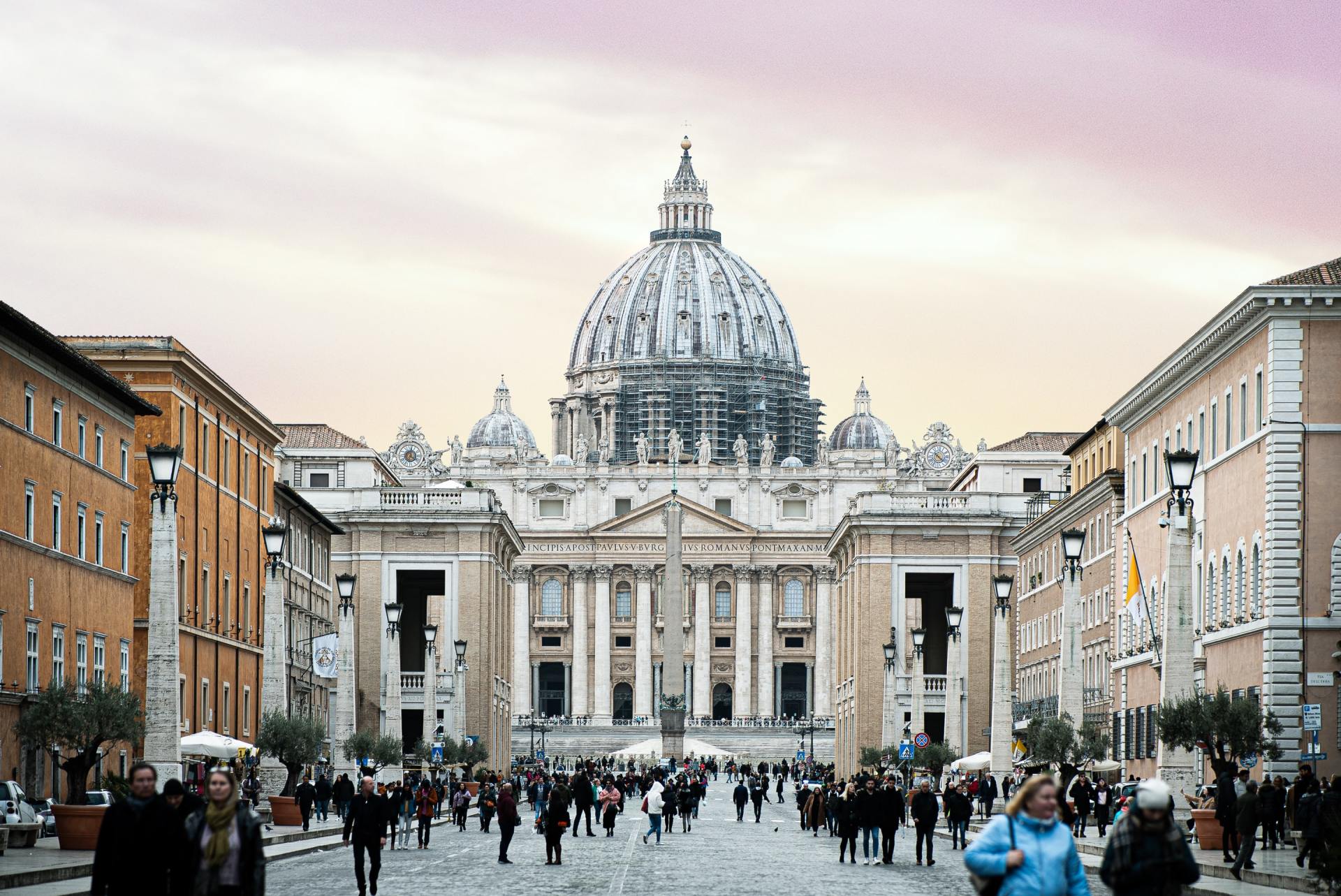A H Harry Oussoren • September 27, 2021
Can the Church Survive without Constantine?

But the Christianity Chose the Way of Constantine!
“Post-Constantinian” has been the adjective in use for the current state of the occidental Christian Church. It all goes back to the early 4th Century when Constantine the Great won control of the Roman Empire (306-337 C.E.) and began to tolerate and then advance Christianity as the official religion contributing to unity in the Empire. By 380 A.D. in the reign of Theodosius, Christianity was the Empire’s established religion. Within Christianity itself, however, unity was and is elusive. Diverse conceptions of God and revelation – theological differences - were and continue to be the ongoing disturber of peace and faithfulness in the global church.
An acquaintance asked me recently, “Would Christianity have survived if it hadn’t bought into the Constantinian arrangement?” As for the question, any response would, of course, be speculative. But for me the question invites reflection on what the Jesus movement might have become and where it may be headed into the future.
Prior to its preferred status, being Christian involved commitment, danger, and, too often, penalty. Companions and friends of Jesus risked much to accompany their Friend – dead and risen. Small groups gathered by faith under the Roman shadow, they huddled to break bread and search scriptures to understand Jesus and his Way for living.
Their Jewish siblings and neighbours challenged them for their new-found convictions, while Roman political authorities saw them as yet another unreliable sect unwilling to “bend the knee” before the divinized imperial majesty. Their new Way invited persecution and prosecution. Martyrdom, in the tradition of Jesus’ own faithfulness, was the lot of many.
But Constantine’s action brought an end to the persecution of Christians and birthed Imperial unity - and uniformity. For the Church, it meant stable, non-threatening peace and opportunity to grow and gain power. It's architecture was inspired by the imperial palace; the cathedra
mimicked the throne.. For the better part of two millennia, Christianity of the western world has been living with this Faustian arrangement.
Associating with political regimes in order to maintain its position of dominance became a well-practiced pattern for the Church. In the middle ages, Roman Imperial conquests led to enforced baptism and suppression of “pagan” and “heathen” religious practices.
At times, ecclesiastical supremacy (theocracy) was blatant. The threat of excommunication made more than one monarch bend the knee before the Bishop of Rome. Later, associating with colonizing political, military, and economic powers gave the Church – Roman Catholic and Protestant - opportunity for organized mission to add to church numbers by converting “heathens”.
At its worst, the Papacy empowered Christian monarchs through the Doctrine of Discovery to take control of colonized land – the Canadian experience! More recently, regimes like Franco’s in Spain, Pinochet’s in Chile were encouraged by prelates to root out those opposing their authoritarianism.
More subtly, social pressures toward uniformity led many in the western world to assume superficial Christian identity through infant baptism. Too often, nationalistic populism with Christian veneers threatened faithful discipleship.
A St. Albans Episcopal Church post of Facebook, (without address), summarizes the 2000 years sojourn of Christianity roughly thus:
In the first century in Israel/Palestine [and Syria], Christianity was [a movement of] believers gathered in community; then Christianity moved to Greece and became a philosophy; then it moved to Rome and became an institution; then it moved to Europe and became a culture; and then it moved to America and became a business.
The Church to empire (political, economic, military) relationship during the Constantinian era has been fraught with contradictions to the Way of Jesus!
Repeatedly Jesus had rejected the temptation to become a political leader even while undermining the imperial authority of Rome and challenging the dominating ways of Jewish religious authorities. The temptations Jesus resisted in the narrative of Matthew 4 reveal his persistent trust in the Divine - “Worship YHWH, and serve only God.” When five thousand people of various backgrounds are fed in the miraculous sharing launched by a child, Jesus resists popular efforts to make him king. He withdraws in order to cool public ardour (John 6:1-15).
Jesus modelled another Way. Confronted by sick, wounded, and marginalized people, he turns to them compassionately with healing care and acceptance. “Sinners” are not repelled but welcomed as beloved human beings and invited to fully human living. Children are welcomed as signs of humility’s grace (Matthew 19:13-15). Creatures are affirmed as protected and blessed by God (Matthew 10:29).
In the face of injustice, Jesus rails against the powerful (Matthew 23:27-38), the ungrateful greed of the wealthy (Luke 16:19-31), and the judgmental legalism of the self-righteous (Mark 2:23-28; John 8:2-11). Walls dividing the human family are broken down (Luke 10:25-37) and relativized by the Golden Rule’s standard to treat others as you want to be treated (Matthew 7:12; Luke 6:31). Self-giving unconditional Love – the essential Divine gift manifested in the crucifixion, death, and rising of Jesus - is made the principal human law.
In recognition of his Spirit-blessed Way and to witness to his Way for them, Jesus’ friends and companions readily called him “kyrios” – Lord, and Christ/Messiah, the Anointed One.
Would Christianity have survived
without the Constantinian arrangement? Was Jesus’ Way just too idealistic, too demanding, too out of touch with human reality, with human sin? The way largely chosen by the Church was about Realpolitik, about accommodating and adapting to the powers that be, while claiming for itself to be the earthly representative of the kingdom of God.
I believe the Church would have survived without the Constantinian arrangement. Biblically the divine promise is clear as Matthew recounts in the closing words of his Gospel (28:20): “Remember, I am with you always, to the end of the age!”
My trust in this promise is substantiated by the fact that throughout Christianity’s dominant but turbulent history there have always been groups of people – usually on the margins of the mainstream – seeking more faithful, less self-serving Ways to express and live their faith. I am struck by the fact that even in the most tyrannical cultures, Christians have chosen to gather and persist in identifying with Jesus’ Way.
To me, this is evidence that the Spirit continues to endow all people with gifts enabling them to mirror Christ’s virtues that empower humans - sometimes many and sometimes but a few - to embrace the Golden Rule and the way of love in relationship with all.
Witnessing to this faithfulness is a favourite little volume that has strengthened my conviction: “Radical Christian Communities” by Thomas P Rausch S.J., A Michael Glazier Book published by The Liturgical Press, Collegeville, MN.
We live in time when most institutions have been humbled - if not humiliated - and experience significant disfavour. Institutional Christianity has particularly suffered much loss of credibility – the causes, past and present, within and outside of the Church, are substantial and many.
We are also heading into a time of great transitions and tribulations which demand of all faiths an analyzing presence and movements that communicate deeper truths and actions to inspire hope.
In those stormy times, there will continue to be Christians and other people of good-will who band together (in person, on-line, and in prayer) to explore the heart of joy-filled faith and the Spirit’s gifts for faithful, respectful, compassionate and just relationships with others.
Professing Christian faith in the ethical, theological, social, and political Way of Jesus will become increasingly challenging in turbulent times. It will demand highly informed and deeply considered faith knowledge and convictions that pierce walls of self-interest and dismantle false witness. Inter-faith conversations and collaboration will help to break down silos of theological tribalism and pretensions of superiority, while broadening the global impact of faith-based leadership.
I think Jesus would be able to recognize in such a movement of faith communities both the Way he lived and the ubiquitos divine Spirit continuing “to work in us and others”.
So, yes, I think the Christian faith would have survived without Constantine and his imperial way. The divine transcends the imperial as the story of Jesus’ humble birth in the Bethlehem’s stable continually reminds us. (Luke 2:1-7)

